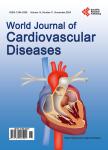Excellent femoral outcomes when all access attempts and closure devices are performed by experienced cardiologists
Excellent femoral outcomes when all access attempts and closure devices are performed by experienced cardiologists作者机构:UPMC Hamot Hospital Erie USA
出 版 物:《World Journal of Cardiovascular Diseases》 (心血管病(英文))
年 卷 期:2013年第3卷第9期
页 面:569-572页
学科分类:1002[医学-临床医学] 100214[医学-肿瘤学] 10[医学]
主 题:Operators Access Complications
摘 要:Femoral access is considered less safe for access site complications than the radial access. Cardiovascular procedures have not been studied taking operator experience, defined as American Board of Internal Medicine, Interventional Cardiology certification or equivalent qualification in another country, into account. We hypothesize that the procedural results are operator dependent and excellent results are obtained when procedures are performed by experienced operators. Femoral access is higher risk than radial access based on American College of Cardiology (ACC) guidelines. Femoral access is less forgiving, as opposed to radial, as it is an end-artery, lacks easy compressibility and is more likely to cause morbidity when injured. Hence, radial is recommended over the femoral approach according to ACC practice guidelines. These guidelines are often based on the randomized studies from academic centers where trainees, with variable arterial access experience, perform the initial access stick and arterial closure device deployment. Methods: We performed a single center retrospective review of 32,446 consecutive patients undergoing invasive cardiovascular procedures done from the femoral approach using American College of Cardiology/National Cardiovascular Data Registry (ACC/NCDR) from January 1, 2006 to June 30, 2013. Only experienced operators performed the actual access site stick and the reminder of the invasive procedure. Results: Total bleeding and vascular complications were less than 1%. We define outcomes as excellent if the total bleeding and vascular complication risk is less than 1% based on previous studies discussed in the ACC guidelines. Conclusion: Excellent outcomes can be obtained from the femoral access if experienced cardiologists perform the procedure. Hence, radial arterial access over the femoral access may be selectively rather than universally recommended considering the possibility of varying level of femoral access expertise of different pra



